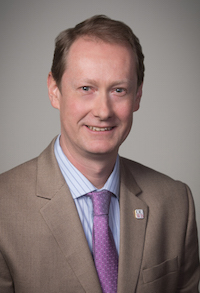
As a way to learn more about the diverse educators who share their expertise with our medical school students, OUWB presents a special interview series called “Take 5.” Let us know what you think.
Assistant Professor Stefan Walter, Ph.D., joined Oakland University William Beaumont School of Medicine in January 2015 in the Department of Biomedical Sciences, specializing in biochemistry. Prior to joining OUWB, Dr. Walter taught and developed life-science courses as an assistant professor at the University of Michigan, Ann Arbor. He earned his undergraduate degree and Ph.D. in Biochemistry at the University of Bayreuth, Germany, where he worked on the folding and stability of proteins. Dr. Walter taught college-level science at Technical University Munich (TUM) and the University of Michigan and conducted seminars and workshops about life sciences and how to analyze and write scientific papers, and designed biochemistry and general chemistry lab and core science courses for medical students. Dr. Walter’s approach to teaching emphasizes helping students learn critical concepts to enable more effective learning while at school and to promote lifelong learning in their professional lives.
What do you enjoy most about your job?
The interaction with the students — to see them accomplish what they’ve dreamed of accomplishing. It gives me great pleasure when there’s something like a difficult scientific scenario or concept and you see students working on it, with the gears turning in their head. Then it clicks and you can read in their faces: “I’ve got it.” This is a very rewarding experience for an instructor.
Can you tell me about when you knew you wanted to be a professor?
It evolved gradually. When I was in high school and thinking about my future, one of the options I pondered was becoming a high school teacher. I was interested in teaching, but not at the university level. Then I got excited about science, and off I went to college to study biochemistry with a research career in mind. Ultimately, I was offered a junior faculty position in Munich. I started taking over teaching responsibilities and realized that this is something I really enjoy doing. That reignited my interest in teaching, so I combined those two passions: Science on one hand and teaching on the other.
Strictly speaking, I’m not a medicine person. I’m a biochemist, and I consider myself as a ‘supporting actor’ with regard to medical education. While biochemistry is central to me, it is only peripheral to what medical students need to know. Because of this mismatch, I was initially reluctant to become involved in medical training. But now that I’m here, I realize that biochemistry is an important building block of the scientific foundation that students need to master to become successful physicians.
You’ve held workshops on how to analyze and write scientific papers, how did that become an interest of yours?
I think the ability to read and write papers is something every student in the sciences needs to acquire. Even if they don’t pursue a career in research or write papers, physicians will always have to keep themselves up to date with the most recent developments in their field. Teaching scientific literacy is a critical component when promoting our students’ ability for lifelong learning. During their third year, OUWB students have the opportunity to participate in a manuscript-writing contest as part of the Embark research program.
Can you share one piece of advice about how we all can become more effective lifelong learners?
This is something personal for me because I try to practice lifelong learning. In the first week after joining OUWB, I went to a biochemistry lecture from one of my colleagues and realized that it was all very different from what I had been used to from my previous teaching positions. There was a substantial learning process involved to master some of the topics and to adjust my teaching style to the new environment. I see challenges as opportunities to try things you haven’t done before, but it requires that you are able to sit down and do an honest self-assessment of your abilities and deficiencies. I think that’s what lifelong learning entails. I try to live that and transfer that kind of attitude to my students. It’s an attitude more than anything else. Medical knowledge changes quickly, and today’s students can’t expect that the knowledge they have acquired during medical school will be enough to treat patients for the rest of their career. Embrace the challenge.
Did anything in particular about OUWB or about OUWB’s mission resonate with you?
Two things: That the students are at the center, and the belief in the importance of training kind physicians, who do not see their patients as research objects or numbers but as people. Empathy and communication with the patient are really key components of treatment. As a patient, I appreciate it if my doctor spends a little bit more time with me and listens to what I have to say. It’s not all pills and procedures. As a patient, if you can talk with a doctor you already feel better. It’s an old-fashioned concept that I think we have to bring back into modern health care.
What is something many people don’t know about you?
I’m a food person. My wife and I both love to cook, and our family tries to have dinner together every day. Cooking and eating together is great for many reasons. It’s a focal point for the family. It also contributes to your health. When you do the cooking, rather than relying on other people to prepare your food, you have more control over what goes into your body. You become more knowledgeable about food and more appreciative. I believe that the fact that fewer and fewer people cook contributes to the health problems we find in modern western societies. We try to teach our 9-year-old daughter how to cook, so she understands the value of food for culture and health.

